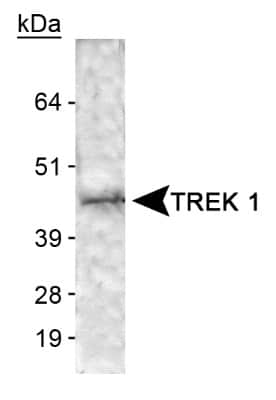KCNK2 Rabbit Polyclonal Antibody
Frequently bought together (2)
beta Actin Mouse Monoclonal Antibody, Clone OTI1, Loading Control
USD 200.00
Transient overexpression lysate of potassium channel, subfamily K, member 2 (KCNK2), transcript variant 1
USD 665.00
Other products for "KCNK2"
Specifications
| Product Data | |
| Applications | IF, IHC, WB |
| Recommended Dilution | Western Blot: 1:1000, Immunohistochemistry (Negative), ICC/IF (Negative) |
| Reactivities | Human, Mouse, Bovine |
| Host | Rabbit |
| Isotype | IgG |
| Clonality | Polyclonal |
| Immunogen | A synthetic peptide within the N-terminal region [residues 1-100] of the human TREK 1 protein. [Swiss-Prot# Q9NRT2] |
| Formulation | Tris-glycine, 150mM NaCl and 0.05% sodium azide |
| Concentration | lot specific |
| Purification | Immunogen affinity purified |
| Conjugation | Unconjugated |
| Storage | Store at -20°C as received. |
| Stability | Stable for 12 months from date of receipt. |
| Gene Name | potassium two pore domain channel subfamily K member 2 |
| Database Link | |
| Background | A potential new target for antidepressants. Nature Neuroscience pp 1134-1141. A potassium channel called TREK1 may represent a new target for antidepressant drugs, according to research published in the September issue of Nature Neuroscience. The channel may exert its effects through a signaling pathway in the brain different to that normally targeted by most conventional antidepressants, which are thought to work by increasing the level of the neurotransmitter serotonin in the brain. Michel Lazdunski and colleagues studied mice lacking the gene for the TREK1 channel, which normally contributes to the background currents that set the resting membrane potential of neurons. In several behavioral tests used to model depression, these mice behaved as if they had been treated with an antidepressant. In addition, they had increased serotonergic activity, and did not release as much of the stress hormone corticosterone as normal mice in response to mild stress. Moreover, the authors report that the TREK1 channel was also directly inhibited by conventional antidepressants. The finding that mice lacking the gene for TREK1 behave as if they have been given an antidepressant suggests that small molecule 'blockers' of the potassium channel might be effective therapeutically. If TREK1 is found to exert its antidepressant effects through a pathway independent of serotonin, it is possible that future therapies targeting TREK1 channels may be faster acting and may have fewer side effects than conventional antidepressants. Deletion of the background potassium channel TREK-1 results in a depression-resistant phenotype pp. 1134-1141. Heurteaux C, Lucas G, Guy N, El Yacoubi M, Thummler S, Peng XD, Noble F, Blondeau N, Widmann C, Borsotto M, Gobbi G, Vaugeois JM, Debonnel G, Lazdunski M. Published online: 13 Aug 2006 | doi:10.1038/nn1749 TREK-1 is a two-pore-domain background potassium channel expressed throughout the central nervous system. It is opened by polyunsaturated fat |
| Synonyms | hTREK-1c; hTREK-1e; K2p2.1; TPKC1; TREK; TREK-1; TREK1 |
| Reference Data | |
| Protein Families | Druggable Genome, Ion Channels: Potassium, Transmembrane |
Documents
| Product Manuals |
| FAQs |
| SDS |
{0} Product Review(s)
0 Product Review(s)
Submit review
Be the first one to submit a review
Product Citations
*Delivery time may vary from web posted schedule. Occasional delays may occur due to unforeseen
complexities in the preparation of your product. International customers may expect an additional 1-2 weeks
in shipping.






























































































































































































































































 Germany
Germany
 Japan
Japan
 United Kingdom
United Kingdom
 China
China



